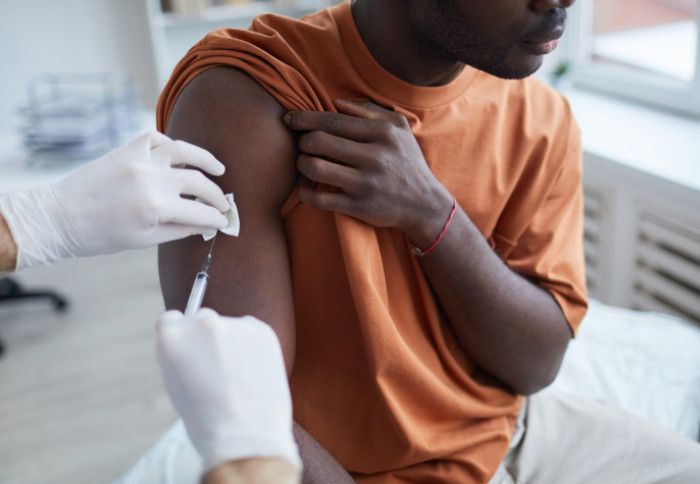COVID-19 vaccine-induced antibody responses are impaired by some IBD treatments

New research led by Imperial shows COVID-19 vaccine-induced antibody responses are impaired in some patients with Inflammatory Bowel Disease (IBD).
[This article was updated 4th February 2022]
The VIP study results show that IBD patients treated with two drugs used to suppress the immune system (infliximab and tofacitinib) may have a reduced response to COVID-19 vaccines.
However, the findings, published in The Lancet Gastro, also show that the other commonly used IBD drugs, including thiopurines, ustekinumab and vedolizumab, did not impair vaccine response.
This latest study, led by Dr James Alexander from the Department of Metabolism, Digestion and Reproduction, is the first to systematically evaluate antibody responses to COVID-19 vaccines, both with mRNA (e.g. Pfizer and Moderna) and adenovirus vector (e.g. Oxford/Astra-Zeneca) vaccines, in patients receiving the full breadth of immunosuppressive therapy types used in IBD.
Inflammatory condition
Inflammatory bowel disease (IBD) is a long-term condition involving inflammation of the gut, and includes both ulcerative colitis and Crohn's disease. Common treatments include the use of immunosuppressive drugs which reduce inflammation by dampening the activity of the immune system, which can also increase the risk of infections.
Currently, there is scarce data on the impact of commonly used IBD treatments on COVID-19 vaccination, and little is known about how patients with IBD respond to vaccination in comparison with people without IBD.
"Based on these results, a third primary dose of COVID-19 vaccines should be urgently rolled out for IBD patients receiving anti-TNF and JAK inhibitors." Dr James L. Alexander Lead author of the VIP Study
Previous studies of IBD patients undergoing vaccination against other infections (such as influenza and pneumonia) show variable effects of different immunosuppressive therapies on vaccine immune responses. While evidence from the CLARITY study showed that people treated with infliximab had significantly lower concentrations of antibodies when compared to people on another treatment, vedolizumab, following vaccination against COVID-19.
The newly released results of the VIP Study, which have been submitted to The Lancet Gastroenterology and Hepatology, show that in addition to the strong impact of infliximab therapy in reducing antibody responses, vaccine-induced anti-SARS-CoV-2 spike (S) antibody responses are significantly reduced in patients treated with tofacitinib, relative to healthy controls.
However, no significant reduction in antibody responses relative to healthy controls was observed in vedolizumab, ustekinumab or thiopurine-treated patients.
Antibody response
Protective antibody levels were seen after two doses of vaccine in all thiopurine monotherapy (i.e. without infliximab), vedolizumab, tofacitinib and healthy control participants. In the absence of prior SARS-CoV-2 infection, failure to induce protective antibody responses was observed in 10% of patients on infliximab, 12% on thiopurine & infliximab combination therapy and 4% on ustekinumab.
In addition to anti-TNF-treated (e.g. infliximab) and anti-TNF & immunomodulator (such as thiopurine) combination-treated patients, patients with IBD treated with JAK inhibitors (e.g. tofacitinib) have poorer antibody responses to COVID-19 vaccination than healthy controls, which exposes them to a potential increased risk of SARS-CoV-2 infection.
The researchers say that no significant reduction in antibody responses relative to healthy controls was observed in thiopurine only, ustekinumab or vedolizumab-treated patients.
The team is now collecting samples from study participants following their third (or booster) dose of the COVID-19 vaccine and hope to report on their impact early in 2022.
This current study has explored humoral (antibody-mediated) immunity, while future work will additionally examine the impact of COVID-19 vaccines on antigen-specific T cell responses.
The study was funded by Pfizer Ltd and supported by the NIHR Imperial BRC.
-
These early-stage findings have not yet been peer-reviewed.
'COVID-19 Vaccine-Induced Antibody Responses are Impaired in IBD Patients Treated with Infliximab or Tofacitinib, but not Thiopurines, Ustekinumab or Vedolizumab' by James Alexander et al. Published: February 03, 2022 DOI:https://doi.org/10.1016/S2468-1253(22)00005-X
For more information on IBD and COVID-19 vaccination, patients should contact their GP or visit the Crohn's and Colitis UK website for the latest information.
Article supporters
Article text (excluding photos or graphics) © Imperial College London.
Photos and graphics subject to third party copyright used with permission or © Imperial College London.
Reporter
Benjie Coleman
Department of Surgery & Cancer